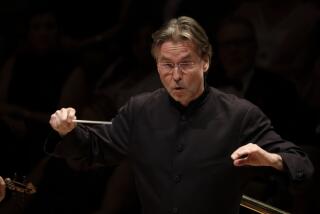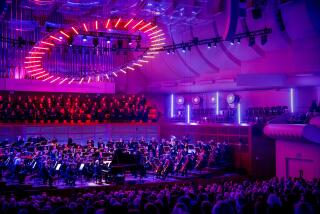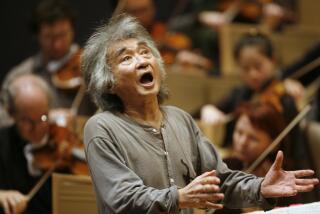Vienna Philharmonic confronts its past, is doing just fine in present
BERKELEY — The Vienna Philharmonic is an orchestra that has always been gripped by as well as in the grip of history — the history of Western music, of which it has played a significant part, and the history of Vienna, of which it has also played a significant part.
Now “Confronting the Past,” has become an official project of the orchestra. In mannerly Viennese fashion, what the orchestra really means is confronting its past.
That is what it did in a special residency as part of the UC Berkeley Cal Performances’ series that included three concerts in Zellerbach Hall along with a two-day symposium examining the orchestra’s history from the outbreak of World War I to the present.
The big and damning question was stated directly. How could a democratic self-governing orchestra in which its members have equal voices and share profits equitably have done what it did during the Third Reich?
PHOTOS: Best classical concerts of 2013 | Mark Swed
Nearly half the musicians joined the Nazi Party. Fifteen Jews were expelled, five of whom were deported to concentration camps where they died. Two died in Vienna; eight went into exile. The orchestra became a gung-ho propaganda tool of totalitarianism.
Everyone involved with the Vienna Philharmonic during World War II was tainted. Yet all those tainted musicians and administrators, to say nothing of its SS-officer patrons, were devoted to great art. They were particularly devoted to the liberating music of Beethoven, which calls forth with incomparable persuasion the highest democratic ideals of the human spirit.
After the war, the orchestra moved on, returning to its obsession with earlier history while whitewashing the — and its — recent past. They pleaded, as did much of postwar Vienna, victimhood, blaming Austria’s German occupiers.
The Vienna Philharmonic was formed in 1842 for the specific purpose of becoming the house band for Beethoven and the other great 19th century Viennese symphonists, a list that had included Mozart, Haydn and Schubert and was to include Brahms, Bruckner and Mahler. Those composers, except Beethoven, were the ones the Vienna Philharmonic played over the weekend.
Friday night’s was the same symphony program of Schubert’s Eighth and Mahler’s Fourth that Lorin Maazel had conducted in Costa Mesa earlier in the week. Saturday night Andris Nelsons, the 35-year-Latvian conductor who becomes music director of the Boston Symphony in the fall, led a Haydn and Brahms program.
PHOTOS: Faces to watch 2014 | Classical music
Sunday afternoon Nelsons filled in on short notice for the Austrian conductor, Franz-Welser Möst, who had taken ill, in the originally planned symphonies by Mozart and Bruckner, but a recent Austrian piece by Johannes Maria Staud, “On Comparative Meteorology,” had to be dropped, which meant that no music written after 1900 was played.
Nelsons is big news. His only West Coast exposure had been conducting the Los Angeles Philharmonic at the Hollywood Bowl in 2008, an unknown 29-year-old about to take over the Birmingham Symphony in England. These days, Nelsons is very much in demand.
He is an exuberant conductor with an awkwardly flamboyant conducting style that exhibits a robustly respectful musicality. He reminds some of Mark Morris in his movements. He has a low center of gravity and moves like a choreographer trying to make dance that illustrates music. He crouches and swoops and wiggles his fingers and makes colorful facial expressions of contagious delight.
Dressed in an oversized black shirt and baggy pants, he also makes a schlumpy and demonstrative contrast to the formal and sharply tailored Viennese, who sit erect and show little emotion. Musicians everywhere are said to adore Nelsons and the Viennese displayed rare affection by waving their bows in the air after a performance of Bruckner’s Sixth Symphony on Sunday.
Saturday’s program began with Haydn’s funniest symphony, his 90th, which has a fake-out ending. Nelsons turned to the audience self-effacingly, as though he had made a mistake, and that was a delight. For Brahms’ Haydn Variations and Third Symphony that night, Nelsons extracted a sumptuous and substantive Viennese sound, making every gesture into something dramatic and compelling.
CRITICS’ PICKS: What to watch, where to go, what to eat
The next afternoon’s symphonies weren’t well known and Nelsons must have had much last-minute studying to do. For Mozart’s early Symphony No. 28, he was decorative and it proved almost the delight of the Haydn.
The Bruckner Sixth was majestic and radiant. From the unearthly opening strings to the arrestingly rhythmic force of the first movement through the gorgeous slow movement and catapulting scherzo to the imposing Finale, the symphony brought out the proud glories of an ensemble meant to play this music.
And yet, “proud” and “glory” can sound like dirty words in conjunction with this orchestra, however glorious. Thus the mea culpa symposium, which was shared by Viennese scholars and Berkeley scholars. They considered the mass hysteria that took over Vienna as even composers such as Schoenberg embraced World War I, but as pointed out in a penetrating talk by Berkeley journalism professor and author Adam Hochschild, they looked foolish for having fallen for so unnecessary and idiotic a war.
Clemens Hellsberg, the president of the orchestra, admitted that it was impossible to make amends for what it represented in the Second World War and proposed the novel theory that generations of musicians who had been raised to make distinctions between high art and lower art had too easily transferred that to making distinctions between higher and lower races.
The orchestra has now embarked on various projects, supporting peace initiatives and sponsoring youth activities. I would suggest adding to that less fetishizing of the past and more embracing the present.
After Sunday’s matinee, groups of the younger players in jeans and T-shirts were having beers in outdoor Berkeley cafes, happily socializing with the women in the orchestra. That was encouraging.
More to Read
The biggest entertainment stories
Get our big stories about Hollywood, film, television, music, arts, culture and more right in your inbox as soon as they publish.
You may occasionally receive promotional content from the Los Angeles Times.







